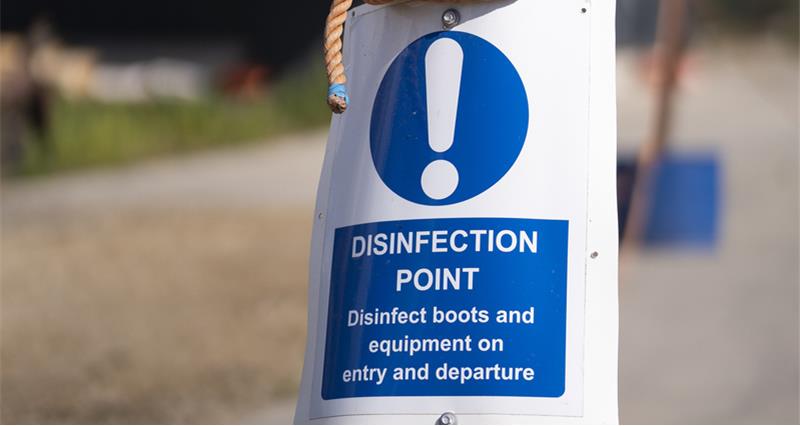Good biosecurity measures are vital to stop and prevent the introduction and spread of disease on your farm and across the UK.Â
With the recent release Red Tractor's updated Chicken Standards manual (version 5.1, October 2022), we've highlighted key points of note. We've also included information on the British Egg Industry Council’s updated biosecurity requirements for the Lion Code.
Red Tractor
The full Red Tractor Chicken Standards (version 5.1) can be found at:
New biosecurity standards
- Reusable equipment must be thoroughly cleansed and disinfected if being used between sheds, including vehicles used for bedding. (BI.6.1)
- If repairs are needed, they should be completed between production cycles, unless animal welfare is at risk. Buildings should be checked at each turn around to ensure housing does not have any leaks or damage. A maintenance log should be kept, recording any damage and repairs. (BI.7.1)
- Birds should not be moved between buildings, movement is only permitted if moving from brood house to finishing sites. (BI.8.2)
- Turn around times can be no less than 5 calendar days from last bird out to first bird in. Flock depopulation and chick replacement records must be kept. (BI.8.3)
Revised biosecurity standards
- A biosecurity policy must be in place, with control measures in place to limit spread of disease. Policy must be reviewed annually and corrected/ updated when needed. (BI.1)
- Farm entrances and exits must be secured. (BI.1.1)
- Essential visitors only with visitor records kept, with entry refused if there is a possible health/ welfare risk to the birds. (BI.2)
- Biosecure areas must be defined on farm/ hatchery maps. (BI.3)
- Access onto farm sites must be controlled with suitable vehicle wheel washing equipment in place with Defra approved disinfectant and drainage. (BI.4)
- Farm specific PPE must be provided and worn when on farm, being washed or discarded between flocks. (BI.5)
- Foot dips should be provided at entrances to general biosecure areas and at each bird biosecure area, Defra approved disinfectants should be used and a disinfectant log should be kept. All staff and visitors should change into site specific footwear or shoe coverings. (BI.6)
- Hand hygiene is essential and suitable hand washing and sanitising facilities should be provided. (BI.7)
- Any staff member employed or contracted must not keep any poultry or avian species. (BI.10)
- No smoking or consumption of food/ drink in bird areas. (BI.12)
- No other animals including pets should have access to poultry houses/ ranges. With naturally ventilated buildings being netted to prevent wild birds entering. (BI.13)
British Egg Industry Council Biosecurity
The full British Egg Industry Council Code of Practice for Lion Eggs (version 7) can be found at:
After a number of consultations, effective from 1 October 2022 an amended biosecurity section was introduced into the Lion Code of Practice, ahead of the full version 8 launch.
These standards have been audited to from 17 October 2022 and the key amendments are summarised below:
- Three ‘tiers’ of biosecurity based on the risk level:
- ‘Peacetime’ i.e., when the risk of AI is low
- When an ‘Avian Influenza Prevention Zone’ (AIPZ) is in place
- When a site is within a Protection Zone / Surveillance Zone
- A named ‘Biosecurity Officer’ is required and this can be the owner of the business or an appointed member of staff
- New definition of ‘Intermediate’ biosecure area as the area immediately outside the poultry house - into the house
- Double step-over barriers:
- when moving from the ‘General’ biosecure area to the ‘Intermediate’ biosecure area a change of footwear is required
- when moving from the ‘Intermediate’ biosecure area to the ‘Specific’ biosecure area, both a change of footwear and protective clothing is required
- Where access to the egg store on a laying farm is through the egg room, the first step-over barrier will need to be removeable to enable pallet truck access. Cleaning and disinfection is imperative after the egg collection
- An ‘Attendance Book’ is required for site staff alongside the existing visitor book requirements
- ABP wagons collecting carcasses must be kept off site

